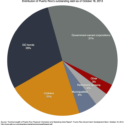The PROMESA board — the oversight board that is working to help get Puerto Rico out of its debt crisis — met in New York City last week. Their meeting lasted for less than half an hour, counting audience protests, and almost every word spoken during the meeting was read.
The board did two important things:
- They chose a chair for the board, Jose Carrion, an insurance broker from Puerto Rico who lives and does business in Puerto Rico. While not everyone has been happy with that choice, many Puerto Rican leaders are pleased that the chair is from Puerto Rico, and the governor has said he is “satisfied” with the choice.
- They asked the Puerto Rico government to provide some specific information about the financial situation in Puerto Rico. They also asked the governor to create a “turnaround plan” for Puerto Rico by October 14th.
The governor has already provided quite a few documents to the board. In general, these reports claim that the end of Section 936 of the tax code is the major cause of the financial problems the territory now faces. They point out that many people have left Puerto Rico to live in one of the 50 states. They list and applaud the efforts made by the government to cope with the problems, especially the cuts in government employment. They suggest a new version of Section 936, a cut in the minimum wage, and some federal concessions as solutions.
The new information the board wants:
- Weekly cash flow reports, disclosing all revenues received and expenses
- Monthly breakdowns of bank accounts
- Monthly and year-to-date compliance with budget
- Monthly and year-to-date revenues
- Monthly detailed payroll reports by agency
- Monthly reports on federal funds disbursed
- Monthly reports on debt and what has been paid
- Agency performance and productivity reports with appropriate metrics
- Quarterly reports on key economic financial and labor statistics
During the meeting, the board also presented the list of things the board will take charge of. These include the government of Puerto Rico, the University of Puerto Rico, the public retirement systems and the government-run public corporations. These corporations include a long list of organizations, from the Convention Center District Authority to the beleaguered power company PREPA to the Tourism Company. That list provides the soundtrack in the video below.
Mario Rubén Carrión created this video for Latino Rebels, to highlight the protests that took place in and outside of the meeting.
There were also objections to the fact that the meeting took place in New York rather than in Puerto Rico.
In November, Puerto Rico’s election will take place and a new governor will be in power (Governor Garcia Padilla is not running for reelection). There will also be a new Resident Commissioner, the representative for Puerto Rico in the United States Congress. House Minority Leader Jenniffer González, the New Progressive Party candidate for resident commissioner, called the board’s meeting “a necessary step” to rebuild the credibility of the government of Puerto Rico, even though it “isn’t making anyone proud.” She also said that she and NPP gubernatorial candidate Ricardo Rosselló intend to work with the board to make its reign as brief as possible. Both Rossello and his rival, David Bernier, have talked about their own turnaround plans. The winner’s plan may be more relevant to the board than the plan they’ve demanded from Garcia Padilla.
Protestor’s have been quoted as saying, ““This is slavery… Our country will resist,” but of course Puerto Rico is not a country. It is an unincorporated territory belonging to the United States. This status is the primary cause of Puerto Rico’s financial problems, and those problems won’t be solved without the resolution of the status question.
Many of the improvements suggested by all parties so far would be accomplished immediately by statehood. The inequality in healthcare funding, the lack of voice in Washington that leads to limited federal benefits, and the lack of tax credits for working families are all the result of the territorial status.








No responses yet